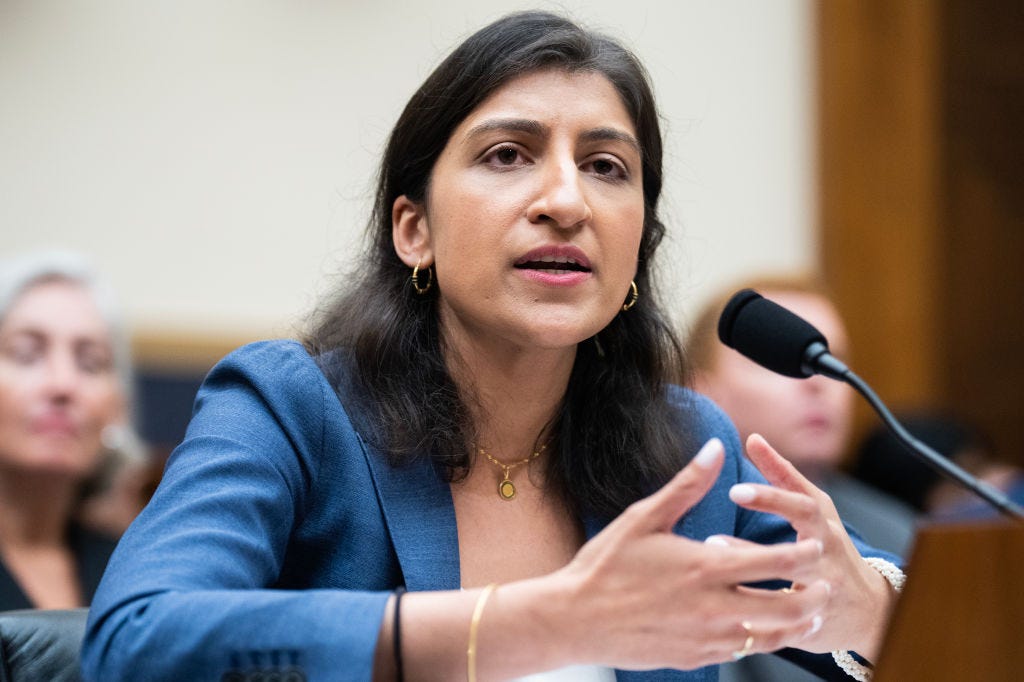Trust busting as freedom
Lina Khan says big companies aren't just ripping you off. They're threatening your liberty. We spoke to America's anti-monopoly cop about how corporate consolidation hurts us all, and how to fight it
This week the House of Representatives passed a bill giving the social video company TikTok a choice: sell to a non-Chinese owner, or face a ban in the U.S. The vote set off a furor among millions of users who stand to lose access to the service and legislators torn about how to rein in the platforms that have grown bigger, more mysterious, and more pervasive in their hold on our lives.
Should TikTok be sold? If so, to whom? Would a deep-pocketed American tech giant swoop in? Would trading Chinese influence over our lives for even greater American corporate consolidation be a good bargain?
Few people have both thought and done more about tech regulation and corporate consolidation in America than Lina Khan. Once a scholar who wrote sharply and critically about the failure to update antitrust law for a new age, she was, remarkably, invited indoors by the Biden administration to do something about her critique.
Now, as Federal Trade Commission chair, she enforces fair competition and cracks down on monopolies and corporate fraud.
In our conversation with her below, she explains what her somewhat arcane area of work means to everyday citizens. When we think of a crisis of democracy, we tend to think of voting and things like that. But the way freedom is lived for most people on most days, Khan says, is in the economy. The way companies behave greatly shapes whether your experience of the world is freedom or coercion, lightness or weight.
Fighting corporate consolidation, Khan argues, is crucial to reviving democracy and making people freer in their everyday lives. Trust us: you don’t want to miss this one.
And a request for those who haven’t yet joined us: The interviews and essays that we share here take research and editing and interviewing and more. We work hard, and we are eager to bring on more writers, more voices. But we need your help to keep this going.
And today we’re offering you a very rare discount of 20 percent if you become a paying subscriber. You will lock in this lower price forever if you join us now!
Balzac wrote, "Behind every fortune lies a great crime." Setting aside the word "every," which is maybe an exaggeration, what do you think are the defining crimes behind the biggest fortunes of today?
I got my start as a reporter and researcher, and my job was to study how different markets had evolved. I spent time talking to chicken farmers, to book authors, to people across a whole set of markets. And it became clear that, over the last 40 years in the United States, we've seen huge waves of consolidation.
You have millions of consumers, thousands of producers, controlled by a handful of companies. These gatekeepers, these dominant middlemen and intermediaries, they play an important function, but the power they've consolidated allows them to pick winners and losers and to enrich themselves as they extract more and more, both from the producers that are actually making stuff and the consumers that are buying it. They’re creating markets that, to a lot of people, just don't seem fair.
You've seen more and more power consolidated and concentrated, and that power being exercised in ways that make other people poorer and more subject to arbitrary whims, and that make them feel more coerced and less free.
So many people say we're in a crisis of democracy, and it's of course a big crisis of democracy, but it takes place in lots of little places also. I think a lot of people may not understand how this specific work you do fits into a bigger question of democracy versus authoritarianism, power for people versus power for the few.
How people experience freedom in their day-to-day lives often involves their economic relationships and what their engagement is like in our commercial sphere. Some of the chicken farmers that I talked to, for example, were so scared of the processors that they were dependent on that they didn't even want to go speak to the government. The fear of retaliation was undermining their free speech rights — core liberties.
Similarly, we see how the expansion of noncompete clauses locks workers into existing jobs, makes it very difficult for them to freely switch employers. Core liberties, again.
One of the original insights of the anti-monopoly tradition in leading up to the passage of the antitrust laws, was that in the same way that we have checks and balances in our political sphere to guard against concentration of political power, that we similarly needed the antitrust laws to safeguard against concentrations of economic power. It was recognized that you really need safeguards on both sides to create real liberty and real democracy.
I wonder how broadly you think about your mandate to regulate tech companies when it comes not just to what we might think of as traditionally deceptive practices, but really corroding democratic participation, the belief in reality, and things like that which might seem a little more ethereal to people.




